- More
- Back
For me, a good murder mystery is also part-thriller, full of twists, turns and surprises. Above all, these 14 (I couldn’t keep it down to just 12 – I love this genre) classics kept me turning the page, wanting to know what happens next, and gasping when I find out what does!
Some of these books and their authors have been my rivals on bestseller lists. Competing with such outstanding works has been an honour, inspiring me to work harder and strive for excellence in my own storytelling. They have pushed me to be more inventive and to consider venturing into new genres, exploring different aspects of mystery and suspense in my writing.
The old classics in this list have a timeless charm and helped build the foundations of the murder mystery genre. The newer additions, with their fresh perspectives and modern twists, show just how much the genre can still evolve and shock even the most seasoned readers.
N.B. As the acknowledged boss of this genre, Agatha Christie gets her own separate list!
Psychological suspense at its absolute best, this book grabbed hold of me from the very first page and refused to let go. The story, revolving around the mysterious disappearance of the girl in question, develops across alternating perspectives, offering a tantalizing puzzle that challenges the reader at every turn. Flynn’s writing is sharp, clever and utterly engrossing, unfolding a tale so intricate that it’s difficult to tell the difference between victim and villain, truth and deceit.
The characters are undoubtedly damaged but brilliantly crafted, making their journey – deep into the shadowy undercurrents of suburban life – all the more compelling. The result is both a thrilling narrative and a profound commentary on modern marriage and the role of the media. A book that left me pondering long after the last page was turned.
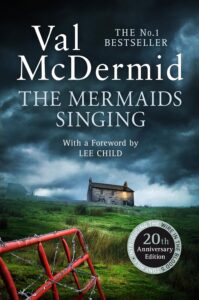
This book introduces us to the character of Tony Hill, a criminal profiler who is as fascinating as he is flawed. Played, of course, by Robson Green in the hugely successful TV series, Wire in the Blood. McDermid’s talent for crafting dark and twisted narratives is on full display here, inviting readers into the mind of a serial killer in a small English town.
But what I enjoyed – if that’s the right word! – most is the way she intertwines the psychological aspects of the characters with the brutality of the crimes, making for a deeply engaging and thought-provoking read. A standout work in the crime canon.
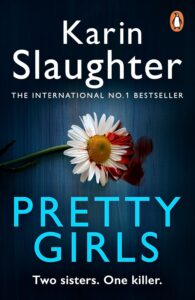
Two sisters, Claire and Lydia are brought together by the disappearance of a third sister, Julia, many years ago. A gripping, heart-wrenching tale that is as much about the strength of family bonds as it is about uncovering dark secrets. The characters are exceptionally well-drawn, with their painful struggles feeling palpably real.
As always, Slaughter refuses to shy away from the harsh realities and the madness that can lurk beneath the surface of ordinary lives. The twists in the story are unexpected and brilliantly executed; a testament to Slaughter’s ability to craft a story that is not only suspenseful but also deeply emotional and, most importantly, character driven.
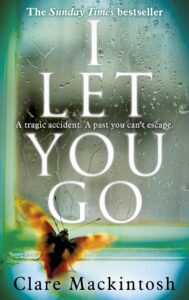
A novel that skilfully intertwines heartbreak with suspense; emotionally charged and yet thrillingly unpredictable – just when I thought I had the plot figured out, Mackintosh introduced twists that left me stunned.
It all begins with a terrible accident, but what we soon uncover is a story of love, loss and the lengths to which people go to escape their past. Mackintosh’s background in the police force lends a striking authenticity to events, particularly in the depiction of the investigation. Like all the best crime novels, it feels frighteningly authentic.
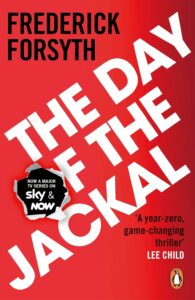
One of the greatest pieces of storytelling that has been published in my lifetime. Characters, plot, pace… Forsythe sets standards that the rest of us can only dream of. I’ve known Freddie for 30 years and we often see each other around Christmas time but very rarely talk about books. Bit of a busman’s holiday, I suppose.
He’s not written anything for about five or six years now, but I read an article recently that seemed to hint he’d got a new idea buzzing around in his brilliant mind. I can’t wait to have him back.
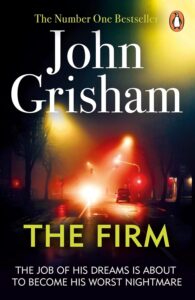
A brilliant man, who has sold a lot of books.
This is a relatively early work and remains his most well know, and perhaps his best (although there are many other greats).
This is a proper blockbuster; BIG storytelling. Why are some authors far more successful than others? If you’d asked me that question a few years ago, I’d have said it’s all about storytelling, no question about it.
But my publishers did a survey where they asked people why they read my books and the most popular answer was: characters. They liked the strong women, who are all based on Mary, of course.
Grisham sells because he gets everything spot on, and you can’t put him down.
The book was then made even more popular by the amazing film, staring the truly brilliant actor Tom Cruise (who hasn’t aged a day).
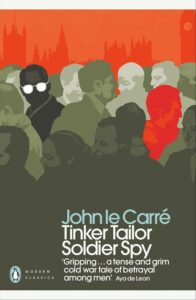
This is, of course, a classic, but I always felt that his earlier stuff was his best, in particular the first two books, Call for the Dead and A Murder of Quality.
They were quite short – almost novellas – but packed real punch. Not that I would have ever dared tell him that. In person, he was a rather fearsome man. And in Smiley, he created one of the greatest characters in English literature.
Younger readers will know the recent film version with Gary Oldman as Smiley but search out the 1979 BBC series with Alec Guinness. A class act!
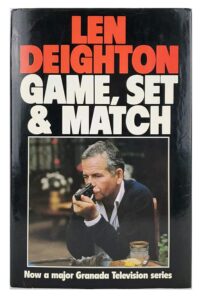 8. GAME, SET & MATCH TRILOGY by Len Deighton (1983-85)
8. GAME, SET & MATCH TRILOGY by Len Deighton (1983-85)This was a tough choice. His book about Germany winning the Second World War, SS-GB, is a fantastic read, but I went for Game, Set & Match because he manages to keep up that level of energy and excitement over three books. Harry Palmer is Deighton’s most famous creation – a British spy played by Michael Caine on the big screen, although he wasn’t called Harry Palmer in the books – but this set of books involves a slightly older, even more jaded officer called Bernard Samson.
Another damn good storyteller, regularly compared to le Carré, but often referred to as the Angry Young Man of espionage fiction. His books seem to have slipped out of fashion, but he’ll be back. Stories this good will always rise to the top.
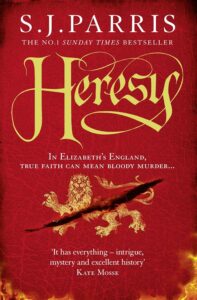
Stephanie Merritt – who works under the pseudonym, S. J. Parris – is a fine writer. Heresy is the first of her books to feature Giordano Bruno, a maverick priest / scientist / philosopher / detective who arrives in London around the time of Elizabeth I. Bruno is a good man, but he’s always landing himself in trouble because of his relentless desire to learn… to know everything about the world and about us.
Bruno is apparently based on a real person, but is the book historically accurate? I’ve no idea because I’m not a scholar. Personally, details like that don’t worry me. Just sit back and enjoy the story.
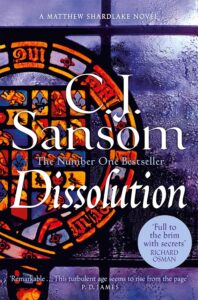
For me, Sansom is Hilary Mantel, but much easier to read. Although I often find myself struggling to finish Mantel’s books, Sansom never feels heavy or laboured. He should have won the Booker Prize; in fact, I’d put him up there with any of the recent Booker winners. Maybe the judges considered him too popular.
Like Sansom used to be, Shardlake is a lawyer, with all the stories set around the time of Henry VIII and Princess Elizabeth. He pulls you right into that world: the Royal intrigue, the plots, the lives of ordinary people. It’s like getting a history lesson from Elizabeth I’s lawyer.
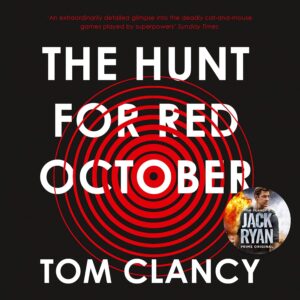
It came out, went straight to number one and it seemed like the whole world was reading it. Looking at it today, the plot does seem far-fetched – a Russian submarine, armed with nuclear warheads, manages to sail right up to the coast of Florida. But this is a novel of its time and during that long period of the Cold War, people were genuinely worried about what was happening between America and the USSR. We still remembered the Cuban Missile Crisis, just over 20 years before. What Clancy created was clever, frightening and absolutely unputdownable.
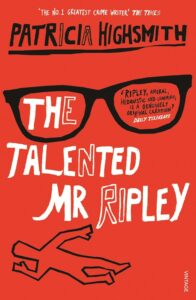
Well, it’s a masterpiece, isn’t it. Such a cruel diagnosis of a human being… and of humanity. But even though he is pure evil, you are still drawn to him, you want to know what he’s going to do next.
I have no idea if Highsmith had difficulty with the character of Ripley, but I’ve always found that villains are much easier to write than good people. Wrong ’uns are interesting; good people are boring. With my William Warwick series, I get far more letters about Miles Faulkner – a criminal mastermind who heaps misery on anyone unfortunate enough to come up against him – than I do about Warwick.
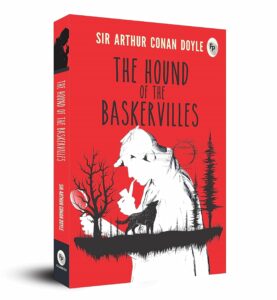
Conan Doyle may be almost as famous as Agatha Christie, but he was nowhere near as prolific. He only wrote a handful of novels and any of them could have made my Top 14. I chose this one because of the impact it had on me as a young boy. As a 13-year-old living in Weston-super-Mare, Sherlock Holmes was the closest thing to a superhero that I’d ever come across. A brilliant mind… never afraid of a bit of rough and tumble. The world took to Holmes and continues to be fascinated by him. Look at the success of the recent BBC adaptation, a hit on both sides of the Atlantic.
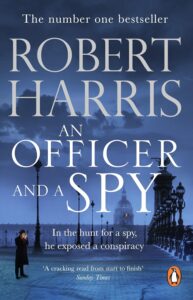
This is the story of a French military intelligence officer who is trying to uncover the truth about the falsified evidence that sent a fellow solider, Alfred Dreyfus – disliked by his superiors because of his Jewish heritage – to the notorious Devil’s Island penal colony off the coast of French Guiana. It is a true story and one that caused a massive political controversy in France at the turn of the 20th century. Other writers have tackled it, but this is the best version out there. I also told Mr Harris that I consider it the greatest book he’s ever written.
For more articles, please visit the Unputdownable Article page, or the Unputdownable Podcast.
Or please read or listen to Chapter 1 of An Eye For An Eye for free.